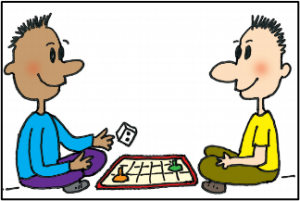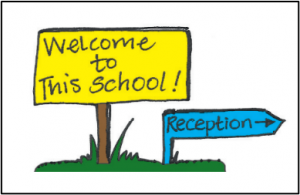What’s in this issue of Alex’s Talkabout Tips?
Welcome to the fourth issue of Alex’s Talkabout Tips! In this issue I am continuing the theme of ‘making sense of social skills’ by thinking about how children develop social skills.
Let’s face it, most parents want their child to be socially competent. We want to have a child who makes friends easily, who is accepted and liked by others, and who effortlessly manoeuvres themselves through the complications of life: the playground, the dinner hall, the classroom, the sleep-over. And most children do learn these skills with seemingly little help from us. But some don’t. They need our support, our help and our patience.
Understanding how children develop social skills is important as it then helps us to understand what we can do to help the child who is struggling. So, in this issue I will talk about the key things that will affect a child’s development of social competence. I will talk briefly about 8 influencing factors: genetics, attention and symbolic development, attachment, child-rearing, observational learning from parents, reinforcement, the role of peers and siblings, and learning the ‘why and when’. All of these usually work together and each plays a small (or not so small) part in the complex nature of developing social skills.
As always, this is just the essential bits! You can read more about all of the theory around social skills in my book ‘Social Skills: developing effective interpersonal communication’(Kelly, 2019).
1. Genetics and biology
 The first thing to talk about is genetics and biology. As one of six children, I was always interested in genetics and in how we all look similar and yet different. And as a mum of 3 boys, I am still interested in the differences, including how socially skilled they are.
The first thing to talk about is genetics and biology. As one of six children, I was always interested in genetics and in how we all look similar and yet different. And as a mum of 3 boys, I am still interested in the differences, including how socially skilled they are.
In the last issue we talked about sex: the difference between boys and girls. But this is more than just gender. Every child is born with a set of genes which determines eye colour, hair colour, and height, but also how they will act around other people – those aspects of their personality and temperament that will affect whether they are outgoing and confident, or shy and cautious.
Rubin (2002) says that children tend to behave in one of 3 ways. They will naturally:
- move towards others,
- move away from others, or
- move against others.
This means that some of a child’s core inclinations in terms of approaching other children will have nothing to do with their environment or their parents but will be down to who they are. So, the first step to understanding their social skills, will be to understand what kind of person they are. Who are they, biologically speaking?
2. Joint attention and symbolic communication
 The second thing to mention is joint attention and the development of symbolic communication. This is because these 2 aspects of a child’s development are important in their future ability to have a conversation. In a conversation, we need to learn to consider the other person – what they are looking at, thinking, feeling – and we need to have an understanding that things have names, and these can be strung together to form sentences.
The second thing to mention is joint attention and the development of symbolic communication. This is because these 2 aspects of a child’s development are important in their future ability to have a conversation. In a conversation, we need to learn to consider the other person – what they are looking at, thinking, feeling – and we need to have an understanding that things have names, and these can be strung together to form sentences.
And we see the beginnings of this by the end of the first year. Children can coordinate their attention between objects and people and follow an adult’s focus and they are learning to interpret the behaviour of others. They are also learning that things have names, and by the age of 2 can use and understand hundreds of words. These are the beginnings of conversations and of social competence.
3. Attachment
 The third factor to mention is parent-child attachment as it can also have an impact on the development of social competence. The theory here is that where there is a secure attachment between the parent and child, the child is more likely to feel safe to explore their interpersonal environment and then is able to grow in their sense of trust in relationships in general.
The third factor to mention is parent-child attachment as it can also have an impact on the development of social competence. The theory here is that where there is a secure attachment between the parent and child, the child is more likely to feel safe to explore their interpersonal environment and then is able to grow in their sense of trust in relationships in general.
My second son did struggle with some of his social skills and relationships early on in life, and looking back, I see attachment as one of the factors that affected him. He was born at a very unhappy time in my life, and in a family that was falling apart, and I do think that this affected his ability to feel safe in his world, and his relationship with me.
4. Child-rearing
 The fourth one is a tricky one, isn’t it? As parents, we know that our child’s behaviour is partly a reflection on our parenting skills, but we also know that ‘good parents’ (whatever that means to you) can have children who are socially incompetent. So, there is not a direct causal relationship between parenting and social competence. It is just one factor that may influence the outcome.
The fourth one is a tricky one, isn’t it? As parents, we know that our child’s behaviour is partly a reflection on our parenting skills, but we also know that ‘good parents’ (whatever that means to you) can have children who are socially incompetent. So, there is not a direct causal relationship between parenting and social competence. It is just one factor that may influence the outcome.
What is interesting, is that researchers have found that children who display competent and incompetent social behaviours receive different treatment from their parents. We may behave in a more restrictive or controlling way with a child who is aggressive, and a more consistent and feelings-orientated way with a child who is calm and amenable. So, the research would say that the child’s inherited temperament (genetics) can affect the parent’s behaviour (child-rearing) which then affects the child’s social behaviour.
5. Observational learning from parents
 The fifth factor is observational learning. We know that social skills are learned as a child is growing up and so it is obvious that parents will mostly have the biggest impact on a child’s learning. As parents, we reward behaviours like smiling and pointing, and we show displeasure over behaviours like shouting and throwing. Children are taught to be polite and to not interrupt, and to ‘look at me when I’m talking to you’, and probably my favourite ‘don’t use that tone of voice with me’! We are modelling certain ways of behaving and children will learn and replicate what we do.
The fifth factor is observational learning. We know that social skills are learned as a child is growing up and so it is obvious that parents will mostly have the biggest impact on a child’s learning. As parents, we reward behaviours like smiling and pointing, and we show displeasure over behaviours like shouting and throwing. Children are taught to be polite and to not interrupt, and to ‘look at me when I’m talking to you’, and probably my favourite ‘don’t use that tone of voice with me’! We are modelling certain ways of behaving and children will learn and replicate what we do.
6. Reinforcement
 The next one is reinforcement; and we do all love a bit of positive reinforcement! People tend to do things associated with positive outcomes and will not do things that didn’t get a positive reward. So, if you laugh at my jokes, I am more likely to tell another one on another occasion. If my mum smiles at me when I say thank you, I am more likely to do it again. Reinforcement increases the probability of that behaviour happening again. And children need this. It can be nonverbal or verbal ‘good job, Ed’ (with a smile), or it can be a material object, a privilege or an activity that is rewarding to the child. But it is the social reinforcers, i.e. the behaviour of others (‘good job, Ed’), that has the biggest impact on a child’s social competence.
The next one is reinforcement; and we do all love a bit of positive reinforcement! People tend to do things associated with positive outcomes and will not do things that didn’t get a positive reward. So, if you laugh at my jokes, I am more likely to tell another one on another occasion. If my mum smiles at me when I say thank you, I am more likely to do it again. Reinforcement increases the probability of that behaviour happening again. And children need this. It can be nonverbal or verbal ‘good job, Ed’ (with a smile), or it can be a material object, a privilege or an activity that is rewarding to the child. But it is the social reinforcers, i.e. the behaviour of others (‘good job, Ed’), that has the biggest impact on a child’s social competence.
7. Peers and siblings
 The seventh factor is peers and siblings as children also learn from them. Children learn when it is OK to be silly, what is the right way to say ‘hi’, and how to behave in the playground. They observe the behaviour of others and then attempt to conform to the norms of their peer group. These are all key factors in helping a child to navigate the complex nature of making friends and being accepted by their peers.
The seventh factor is peers and siblings as children also learn from them. Children learn when it is OK to be silly, what is the right way to say ‘hi’, and how to behave in the playground. They observe the behaviour of others and then attempt to conform to the norms of their peer group. These are all key factors in helping a child to navigate the complex nature of making friends and being accepted by their peers.
8. Learning the ‘why and when’
 Finally, number eight. A child needs to learn the why and when to behave in a certain way. Initially that will be the role of the parents or teachers to explain why ‘they can’t do that when granny is there’, but as they get older, they start being able to assess situations for themselves and decide which course of action to take. This is when children start to use their knowledge of what other people think and feel to help them alter their behaviour.
Finally, number eight. A child needs to learn the why and when to behave in a certain way. Initially that will be the role of the parents or teachers to explain why ‘they can’t do that when granny is there’, but as they get older, they start being able to assess situations for themselves and decide which course of action to take. This is when children start to use their knowledge of what other people think and feel to help them alter their behaviour.
So, in summary…
The development of social skills is a varied and wonderful thing. Some children head happily off to school and talk to relatives in a confident and cheerful manner, while some struggle at each encounter. How each child develops their social skills is possibly more complex than we realise. But hopefully reading about the above 8 factors will give you a starting point to understanding this interesting subject.
Please do comment on Facebook or share this with others. If you would like to be added to my email distribution list, please contact me through the website, email me directly or PM me.
Thanks for reading!
Rubin K, the friendship factor: helping our children to navigate their social world and why it matters for their success and happiness Penguin books 2002






